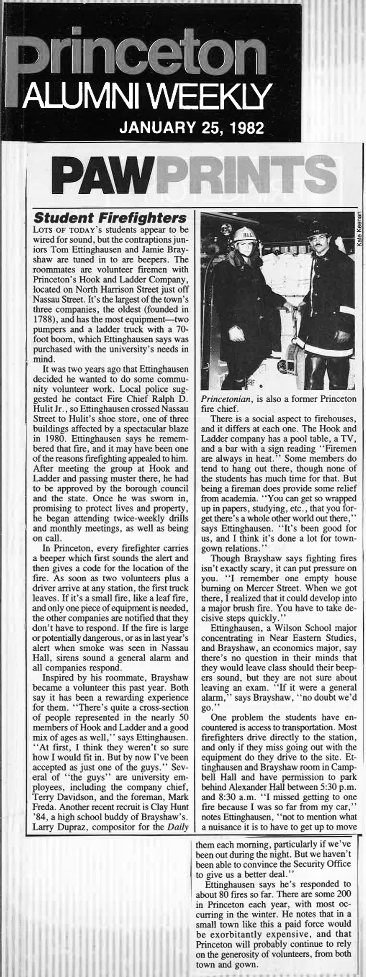
Princeton Alumni Weekly
25 January 1982
Student Firefighters
Lots of today’s students appear to be wired for sound, but the contraptions juniors Tom Ettinghausen and Jamie Brayshaw are tuned in to are beepers. The roommates are volunteer firemen with Princeton’s Hook and Ladder Company, located on North Harrison Street just off Nassau Street. It’s the largest of the town’s three companies, the oldest (founded in 1788), and has the most equipment—two pumpers and a ladder truck with a 70- foot boom, which Ettinghausen says was purchased with the university’s needs in mind.
It was two years ago that Ettinghausen decided he wanted to do some community volunteer work. Local police suggested he contact Fire Chief Ralph D. Hulit Jr., so Ettinghausen crossed Nassau Street to Hulit’s shoe store, one of three buildings affected by a spectacular blaze in 1980. Ettinghausen says he remembered that fire, and it may have been one of the reasons firefighting appealed to him. After meeting the group at Hook and Ladder and passing muster there, he had to be approved by the borough council and the state. Once he was sworn in, promising to protect lives and property, he began attending twice-weekly drills and monthly meetings, as well as being on call.
In Princeton, every firefighter carries a beeper which first sounds the alert and then gives a code for the location of the fire. As soon as two volunteers plus a driver arrive at any station, the first truck leaves. If it’s a small fire, like a leaf fire, and only one piece of equipment is needed, the other companies are notified that they don’t have to respond. If the fire is large or potentially dangerous, or as in last year’s alert when smoke was seen in Nassau Hall, sirens sound a general alarm and all companies respond.
Inspired by his roommate, Brayshaw became a volunteer this past year. Both say it has been a rewarding experience for them. “There’s quite a cross-section of people represented in the nearly 50 members of Hook and Ladder and a good mix of ages as well.” says Ettinghausen. “At first, I think they weren’t so sure how I would fit in. But by now I’ve been accepted as just one of the guys.” Several of “the guys” are university employees. including the company chief, Terry Davidson, and the foreman, Mark Freda. Another recent recruit is Clay Hunt ’84, a high school buddy of Brayshaw’s. Larry Dupraz, compositor for the Daily Princeionian, is also a former Princeton fire chief.
There is a social aspect to firehouses, and it differs at each one. The Hook and Ladder company has a pool table, a TV, and a bar with a sign reading “Firemen are always in heat.” Some members do tend to hang out there, though none of the students has much time for that. But being a fireman does provide some relief from academia. “You can get so wrapped up in papers, studying, etc., that you forget there’s a whole other world out there,” says Ettinghausen. “It’s been good for us, and I think it’s done a lot for town-gown relations.”
Though Brayshaw says fighting fires isn’t exactly scary, it can put pressure on you. “I remember one empty house burning on Mercer Street. When we got there. I realized that it could develop into a major brush fire. You have to take decisive steps quickly.”
Ettinghausen, a Wilson School major concentrating in Near Eastern Studies, and Brayshaw, an economics major, say there’s no question in their minds that they would leave class should their beepers sound, but they are not sure about leaving an exam. “If it were a general alarm,” says Brayshaw, “no doubt we’d go.”
One problem the students have encountered is access to transportation. Most firefighters drive directly to the station, and only if they miss going out with the equipment do they drive to the site. Ettinghausen and Brayshaw room in Campbell Hall and have permission to park behind Alexander Hall between 5:30 p.m. and 8:30 a m. “I missed getting to one fire because I was so far from my car,” notes Ettinghausen, “not to mention what a nuisance it is to have to get up to move them each morning, particularly if we’ve been out during the night. But we haven’t been able to convince the Security Office to give us a better deal.”
Ettinghausen says he’s responded to about 80 fires so far. There are some 200 in Princeton each year, with most occurring in the winter. He notes that in a small town like this a paid force would be exorbitantly expensive, and that Princeton will probably continue to rely on the generosity of volunteers, from both town and gown.